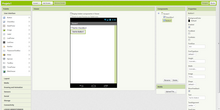 MIT App Inventor | |
| Original author(s) | Hal Abelson, Marky Freddy |
|---|---|
| Developer(s) | Google, MIT Media Lab, MIT Computer Science and Artificial Intelligence Laboratory |
| Initial release | December 15, 2010 |
| Stable release | nb194c
/ September 14, 2023 |
| Repository | github |
| Written in | Java, Swift, Objective-C, Kawa, Scheme, JavaScript, HTML |
| Operating system | Android, iOS |
| Available in | 19 languages |
List of languages English, Spanish, French, Italian, Korean, Dutch, Portuguese, Brazilian Portuguese, Russian, Swedish, Simplified Chinese, Traditional Chinese, Polish | |
| Type | Application software development IDE |
| License | Creative Commons Attribution ShareAlike 4.0 Unported, Apache 2.0 |
| Website | appinventor |
MIT App Inventor (App Inventor or MIT AI2) is a high-level block-based visual programming language, originally built by Google and now maintained by the Massachusetts Institute of Technology. It allows newcomers to create computer applications for two operating systems: Android and iOS, which, as of 25 September 2023[update], is in beta testing. It is free and open-source released under dual licensing: a Creative Commons Attribution ShareAlike 3.0 Unported license and an Apache License 2.0 for the source code. Its target is primarily children and students studying computer programming, similar to Scratch.
The web interface consists of a graphical user interface (GUI) very similar to Scratch and StarLogo, allowing users to drag-and-drop visual objects to create an application that can be tested on Android and iOS devices and compiled to run as an Android app. It uses a companion mobile app named MIT AI2 Companion providing live testing and debugging.
App Inventor provides integration with different online services, such as Google Sheets and Firebase.
When creating App Inventor, Google drew upon significant prior research in educational computing, and work done within Google on online development environments.[1]
- ^ Hardesty, Larry (August 19, 2010). "The MIT roots of Google's new software". MIT News Office.